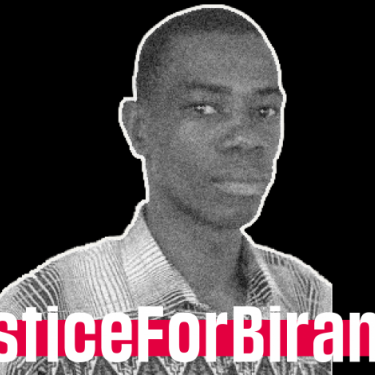Malian journalist who disappeared six years ago is very likely dead, RSF says

An investigation by Reporters Without Borders (RSF) has established that Birama Touré, a Malian journalist who disappeared six years ago, very probably died as a result of being tortured while secretly held by Mali’s intelligence agency. RSF urges the Malian justice system to keep working tirelessly to shed light on this case.
After registering his upcoming marriage at Bamako’s city hall and spending the afternoon with his family, Touré, set off for home on his motorcycle on the night of 29 January 2016. None of his friends and relatives has seen him since then. Six years later, RSF is in a position to affirm not only that he was secretly detained at a clandestine prison run by Mali’s General Directorate for State Security (DGSE) but also that he most likely died as a result of being mistreated and tortured there, according to damning new testimony obtained in recent months.
Since our revelations last July, we have gathered very specific new information from persons who were held at the same time or just after Touré at the DGSE detention centre. One of these sources claimed to have met him during a cell change. He described Touré, who was then being held in “Room 7” of this secret prison, as “bloated” as a result of having been tortured to the point that one would have thought he was “a man of great corpulence.”
Died after being tortured in the “fridge”
On the basis what we were told by another witness, whom we regard as very credible and whose identity we are also protecting for security reasons, we have concluded that Touré did not survive his injuries. One evening, Touré was taken to the “fridge,” a special cell in which prisoners were tortured, beaten, hung for hours on iron bars with their feet barely touching the ground, and sometimes mutilated or raped. He was later brought back to his cell with blood on his face and anus, and he did not wake up again. According to this witness, Touré’s body was wrapped in a mat the next morning, placed in the back of a white pick-up truck, and taken out the compound that houses the DGSE jails. The witness says this operation was carried out in the presence of then President Ibrahim Boubacar Keïta’s son, Karim Keïta, then DGSE chief Gen. Moussa Diawara, several other DGSE officials and two journalists who have since died.
At the time of his disappearance, Touré had been investigating two stories involving Karim Keïta. He had begun gathering information about the affair Keïta was reportedly having with the wife of one of his friends. And RSF has learned in recent months that Touré had also been looking into a series of weapons contracts in which a great deal of money was reportedly embezzled, at a time when Karim Keïta was a key figure in security matters and ran the national assembly’s defence commission. One of Touré’s fellow detainees said Touré told him he was arrested “on orders” from Karim Keïta. Le Sphinx, the investigative weekly for which Touré worked, was also taking a close interest in the president’s son at the time of Touré’s mysterious disappearance. The cover page of the issue published on 5 February 2016, a week after his disappearance, was dedicated to Karim Keïta’s reported acquisition of a private jet. All these factors undoubtedly played a role in last July’s decision by a Malian investigative judge to issue a warrant for the arrest of Karim Keïta, who fled to Côte d’Ivoire after his father was ousted in a coup in August 2020. The Ivorian authorities have still not executed the warrant.
“There is now a body of evidence and corroborating testimony indicating that a very serious crime took place, that this journalist was the victim of an enforced disappearance or death preceded by acts of torture,” said Arnaud Froger, the head of RSF’s Africa desk. “But six years after his disappearance, the body has still not been found, suspects are still at large, key witnesses have died and the political and security context in Mali remains very fragile. This poses significant risks to the outcome of the investigation. It is imperative that the Malian judicial authorities pursue their efforts and give themselves the resources needed to shed all possible light on this case.”
RSF contacted both Karim Keïta’s lawyer, Mamadou Gaoussou Diarra, and Gen. Moussa Diawara’s lawyer, Jean Claude Sidibé, but neither wanted to respond to questions about the evidence incriminating their client.
There are many obstacles that could still prevent the authorities from solving this case, as RSF points out in this video about the investigation carried out jointly by RSF and Le Sphinx editor Adama Dramé. Three key witnesses have so far died, probably taking some of the facts with them, and time is pressing. Several persons suspected of being involved in Touré’s detention, torture and even death are still at large.
Mali is a dangerous country for journalists. Two Radio France Internationale journalists, Ghislaine Dupont and Claude Verlon, were murdered there in 2013. And several journalists have been abducted in recent years, especially by armed groups. They include Olivier Dubois a French journalist who was abducted while on a reporting trip to the northeastern city of Gao on 8 April 2020 and who is still held by the Support Group for Islam and Muslims (JNIM).
Mali is ranked 99th out of 180 countries in RSF's 2021 World Press Freedom Index.



